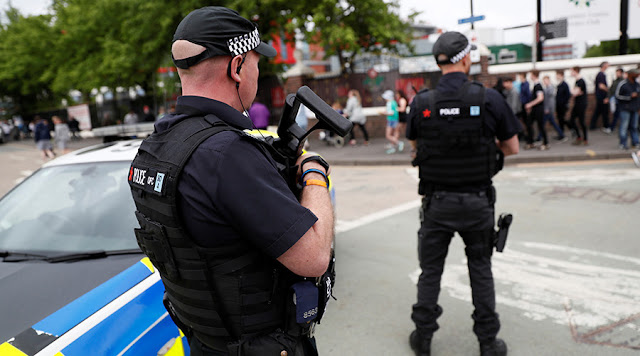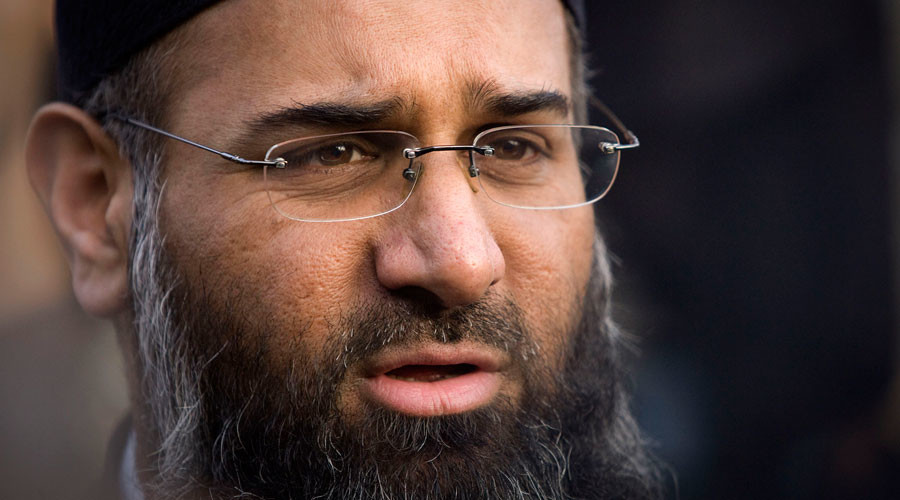Jonathon Gatehouse, CBC News
In this handout photo issued by the London Metropolitan Police, Salisbury Novichok poisoning suspects Alexander
Petrov and Ruslan Boshirov are shown on CCTV on Fisherton Road, Salisbury, the day of the nerve-agent attack.
(Metropolitan Police via Getty Images)
There are somewhere between 4 million and 6 million CCTV cameras in the United Kingdom, according to the best estimates.
The Metropolitan Police in London operate 10,000 of them. The city's underground has 11,000 in use. And the major rail network that spans the country boasts 4,000 more.
All of which helps explain how British investigators were able to track almost every step of the two Russian men they charged today in connection with the March 4 Novichok poisoning of ex-spy Sergei Skripal and his daughter Yulia in the southern city of Salisbury.
Alexander Petrov, right, and Ruslan Boshirov are suspected of poisoning former Russian spy Sergei Skripal
and his daughter Yulia. (EPA-EFE)
A team of 250 officers examined 11,000 hours of footage to zero-in on their suspects and then piece together how they carried out the attack.
Standing in the House of Commons this morning, Prime Minister Theresa May outlined the "painstaking and methodical work" that led police to identify and charge Alexander Petrov and Ruslan Boshirov in absentia with conspiracy to murder, attempted murder and possession and use of the deadly nerve agent. And to link the men to the later, presumably accidental, poisoning death of Dawn Sturgess and the sickening of her boyfriend Charlie Rowley.
May explained how the Russian pair arrived at London's Gatwick airport at 3 p.m. on Friday, March 2, aboard an Aeroflot flight. They then travelled to the city centre by train, taking the tube to their discount hotel near the main site of the 2012 Summer Games.
In this photo issued by the Metropolitan Police, Salisbury Novichok poisoning suspects Alexander
Petrov and Ruslan Boshirov are shown on CCTV at Salisbury train station on March 3.
(Metropolitan Police via Getty Images)
They journeyed by train to Salisbury the next afternoon, on what police believe was a reconnaissance mission, returning to London two hours later.
May described how on Sunday, March 4, the day the Skripals fell deathly ill, the two men took a morning train to Salisbury. They were filmed walking along a road near Sergei's home just before noon. By late afternoon, they were back in London and one their way to Heathrow, where they boarded another Aeroflot flight to Moscow, touching down in Russia before British authorities even figured out what they were dealing with.
"There is no other line of inquiry beyond this," May told the Commons, saying her government believes the two men are agents of the GRU, Russia's military intelligence service.
A reasonable assumption, although it is certainly possible they were working for someone who wants to destroy Putin. If that were the case, I seriously doubt that Putin would protect them as he appears to be doing.
Skripal was, apparently, sharing info on Russian oligarchs to MI5, which would be the obvious motive for attempting to kill him. It means, Putin may not have been involved, or Putin may have been protecting the oligarchs, of which he is one. Again, his protection of the agents who appear to have administered the Novichok, may indicate the latter to be true.
A still image from CCTV footage recorded on Feb. 27, 2018, shows former Russian spy Sergei Skripal
buying groceries at the Bargain Stop convenience store in Salisbury. (AFP/Getty Images)
"As we made clear in March, only Russia had the technical means, operational experience and motive to carry out the attack."
At a news conference in London, Metropolitan Police Assistant Commissioner Neil Basu, a senior counter-terrorism investigator, released a dozen images of the men, showing their arrival on British soil, journeys in London and Salisbury, and eventual departure.
He confirmed the Russian passports were authentic and that the men had used them to enter the U.K. on several previous occasions. But Basu said that police assume the names the men used are aliases, and appealed for information about their true identities.
Police also disclosed new details about how the Novichok was smuggled into the country, providing pictures of a bronze-coloured Nina Ricci 'Premier Jour' perfume box and bottle. The manufacturer says both are fakes.
The counterfeit perfume atomiser found at the property of Novichok poisoning victim Charlie Rowley
had a modified spray mechanism. (Metropolitan Police via Getty Images)
Detectives believe that the two men sprayed the nerve agent over Skripal's front door using a long white plastic spray nozzle.
In mid-June, Charlie Rowley found the perfume box and bottle inside a charity donation bin in the nearby town of Amesbury and took it home. He spilled some of the bottle's contents on his hands while attaching the nozzle. Sturgess, his partner, sprayed a great deal more on her wrists and fell ill almost immediately.
The U.K. has issued Europe-wide arrest warrants for the two suspects and has added their names to Interpol's red notice list, but there will be no formal extradition request as the Putin government will not allow its citizens to be tried overseas.
"Should either of these individuals ever again travel outside Russia, we will take every possible step to detain them, to extradite them and to bring them to face justice here in the United Kingdom," May told the House of Commons.
Yulia Skripal, who was poisoned in Salisbury along with her father, has recovered from the attack
and is seen here speaking to reporters in London on May 23. (Dylan Martinez/Reuters)
And in the interim, the U.K. will push for new EU sanctions against Russia, and will step up counter-intelligence operations against the GRU, the prime minister added.
But justice will be difficult, if not impossible, to achieve.
In Moscow, Yuri Ushakov, a senior aide to Russian President Vladimir Putin, told reporters that the names released by the British "do not mean anything to me."
Andrey Kortunoy, director general of the Russian International Affairs Council, suggested that "two photos and two maybe fake names doesn't mean that much."
An exceptionally cool response in a renewed Cold War.
Is Putin trying to take Russia back into the Soviet days? Does he consider them to be the glory days of the empire? They were certainly the glory days of the KGB; perhaps Putin thinks they are one and the same?
















